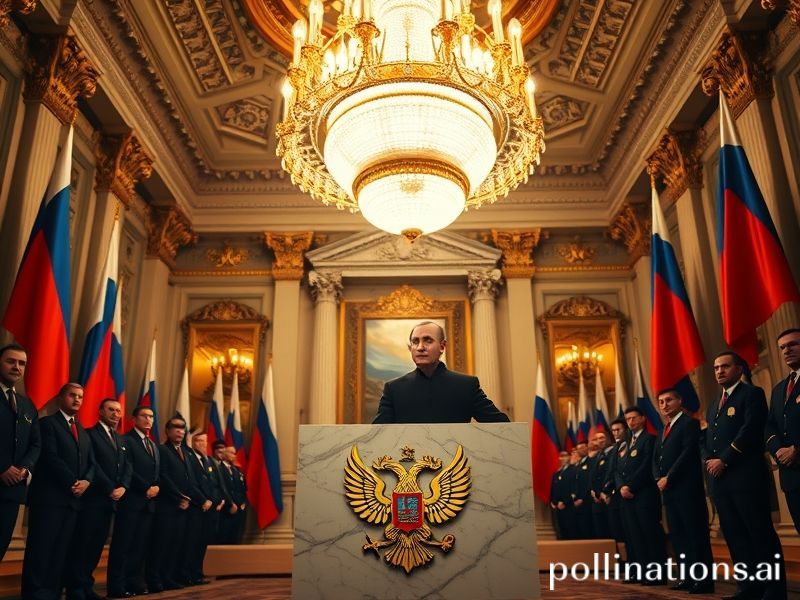Putin’s Russia: The World’s Favorite Unhappy Ending in Three Rings
Vladimir Putin’s Russia: A Global Game of Musical Chairs Where the Music Never Stops
By Our Correspondent in a Non-Extradition Country
Somewhere between the Arctic permafrost and the subtropical beaches of Sochi, the world’s largest country keeps reinventing itself with the grace of a drunken ballerina on stilts. Twenty-four years after a soft-spoken KGB lieutenant-colonel promised to “restore order,” Russia has become the geopolitical equivalent of a three-ring circus: one ring devoted to war, one to energy extortion, and the third reserved for elaborate disappearing acts—journalists, opposition figures, and once-reliable trade partners vanish nightly. The audience, seated in Berlin, Beijing, Brasília, and Boston, watches in polite horror while secretly checking the exits.
The immediate spectacle is, of course, Ukraine—Europe’s biggest land war since Grandpa’s day. Western capitals keep shipping weapons the way one sends unsolicited fruit baskets: hopeful, slightly passive-aggressive, and accompanied by notes that read “From your friends who’d rather you just stopped.” Meanwhile, Kyiv’s counter-offensives have turned into a grim international Kickstarter campaign where stretch goals include “basic electricity” and stretch realities include “territorial integrity.” Every HIMARS launcher that leaves Florida is another reminder that globalization now lets you crowd-source carnage with same-day shipping.
Yet the war is merely the overture. Russia’s real export these days isn’t tanks or Tchaikovsky but instability, conveniently priced in petrodollars. India buys discounted crude and pretends it’s a savvy business decision, not geopolitical money-laundering. China scoops up Siberian gas, then lectures the world about sovereignty while helping Moscow circumvent sanctions with the sort of creative accounting that would make Enron blush. Turkey plays both arsonist and firefighter, selling drones to Ukraine one week and brokering grain deals for Russia the next—an act of mercantile acrobatics worthy of Cirque du Soleil, if Cirque du Soleil accepted payment in blood diamonds.
Europe, meanwhile, is learning that virtue signaling doesn’t heat homes. German politicians who once posed for selfies at climate marches are now quietly reactivating coal plants faster than you can say “Energiewende.” Italians, once smug about their espresso diplomacy, watch utility bills climb like a cosmonaut on a vodka-fuelled rocket. And the British—oh, the British—have discovered that Brexit doesn’t insulate you from the price of methane any more than a Union Jack umbrella wards off the rain. Each new sanction package is wrapped in moral clarity, then undercut by loopholes labeled “agricultural products” or “pharmaceutical exemptions,” proving that hypocrisy is the only commodity still tariff-free.
In the Global South, the war is background noise to bigger concerns—drought, debt, and the nagging suspicion that the “rules-based order” is a VIP club that never sent invitations. When African delegations arrive in Moscow for grain talks, they’re greeted with imperial pomp and the unspoken message: “We can starve you slower than the West can save you.” It’s a sales pitch as old as empire itself, now delivered with QR codes and Telegram channels.
All the while, Russia’s domestic stage gets darker. Elections are held the way one renews a gym membership: automatic, uneventful, and accompanied by a vague sense that the equipment is plotting against you. Dissent is funneled into YouTube exile channels that rival Netflix for production value; Navalny’s prison vlogs boast higher ratings than most sitcoms. The average Russian, polling suggests, oscillates between weary patriotism and gallows-humor fatalism—an emotional cocktail best summarized by the viral joke: “We thought we’d hit rock bottom, but then someone knocked from below.”
What does the planet learn from this long-running tragicomedy? First, that deterrence is a perishable good—best kept refrigerated, not left on the windowsill of wishful thinking. Second, that energy dependence ages about as well as milk in the sun. And third, that every empire eventually discovers the bill comes due in the currency of credibility. Until then, the music plays on, chairs are yanked away, and the rest of us pray we’re not left standing when the lights finally come up.







